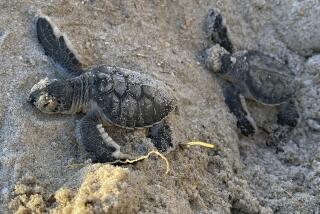Rise in Turtle Deaths May Be Good Sign--or a Bad One : Texas: Marine biologists see a jump in strandings along the state’s coastline. It could mean there are more sea turtles now, or it could mean more are dying in nets.
- Share via
HOUSTON — Marine biologists say a drastic jump in the number of sea turtles washing up on Texas beaches this past year reflects both good and bad trends in conservation efforts.
More than 500 sea turtles, about half of them endangered Kemp’s ridleys, have washed ashore so far in 1994, far more than any year in the past decade.
David Owens, a marine biologist at Texas A&M; University, said the increase is caused partially by successful efforts to bolster turtle populations. But increasing numbers of Gulf of Mexico shrimpers apparently are ignoring use of a federally required device to eject turtles from nets.
“The good news is the appearance that there may be some success in the (conservation) efforts,” said Owens, who has spent 20 years studying sea turtles. “The bad news is if we don’t increase the care with which we use turtle excluder devices, it’s going to be for naught.”
Donna Shaver, the Texas Department of Parks & Wildlife biologist in charge of a state network for tracking sea turtle deaths, said 506 stranded sea turtles had washed up on Texas shores this year as of Nov. 29.
That total already is nearly triple last year’s 185. The highest previous annual total over the past decade was 355 in 1990.
More than 253 Kemp’s ridleys, including 27 of the roughly 580 adult females known to exist, were among those that washed ashore this year, Shaver said. Another 120 or so Kemp’s ridleys have washed up in Louisiana this year.
Female Kemp’s ridleys lay their eggs on beaches in Rancho Nuevo, Mexico, just south of the Texas border. The imperiled species neared extinction in the mid-1980s because of egg-eating natural predators and nest-raiding poachers. The adult female population dipped below 200 at one point.
An aggressive conservation plan on both sides of the border has included teams of volunteers rounding up the eggs and moving them to protected beach areas. Shrimpers have also been required to install the turtle excluder devices, known as TEDs, which allow turtles to escape nets through a hole.
The efforts have paid off, with the adult female population tripling. Shaver said no one knows how many Kemp’s ridleys exist, but their overall population is certain to have gone up along with the nesting females.
Shaver was alarmed, however, by the drastic jump in stranded turtles in Texas this year. Some of the increase probably is caused by conservation efforts, but most of it is because shrimpers aren’t using TEDs or use them improperly, she said. Shrimpers complain that the devices reduce their catches.
“A very large proportion of the turtles stranded this year were stranded as a result of being caught in shrimp nets,” Shaver said from her office on South Padre Island. “The population doesn’t go up 2 1/2 times in one year.”
The shrimping industry claims that the vast majority of the state’s 4,500 licensed trawlers use TEDs. Owens, however, said even a small number of lawbreakers could offset conservation gains.
He said he and other marine biologists in Texas are working on suggestions for persuading more shrimpers to comply with the law. He favors education over increased enforcement.
“I believe in education because I believe shrimpers have a vested interest in using those things right,” Owens said, adding that TEDs eject such creatures as sharks and stingrays from nets. “Plus it’s in their own best interest to get the government off their back.”
Scott Smullen, a National Marine Fisheries Service spokesman in Washington, said nearly all shrimpers are believed to be using the devices. Some, however, have sewn the devices shut or are using them at the wrong angles either out of ignorance or to skirt the law, he added.
He said the agency, which works with the U.S. Coast Guard to inspect trawlers, is planning ways to improve oversight and educate shrimpers.
More to Read
Sign up for Essential California
The most important California stories and recommendations in your inbox every morning.
You may occasionally receive promotional content from the Los Angeles Times.










